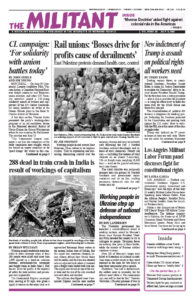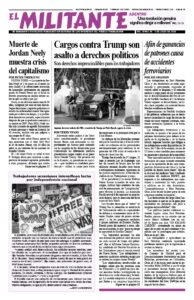MALVERN, Pa. — Several hundred United Mine Workers of America members and retirees and other unionists demonstrated at the Vanguard Group investment company headquarters here June 6 in solidarity with Warrior Met Coal union members. They are demanding to be rehired with their union intact after a nearly two-year strike in Brookwood, Alabama.
Another key demand is to restore the jobs of 41 strikers barred by the company for alleged picket line violations. This includes many of the strike leaders.
Vanguard has the largest holdings in Warrior Met. The mine is now one of the most profitable U.S. coal companies.
Warrior Met was set up by the biggest outstanding creditors, including Vanguard, when the previous owner, Jim Walter Resources, went bankrupt in 2015. The new owners told miners they had to accept deep cuts in wages, benefits and working conditions or the mine would be closed, with a promise to make it up to them when the company got back on its feet.
But when the contract expired in 2021, bosses offered little change over the previous concession contract. The miners rejected it and went on strike.
Miners are gradually returning to work after a February “unconditional offer to return to work” agreement between the international union leadership and company. They are going back to jobs alongside scabs hired by the bosses during the strike. Miners who worked there for years are facing company-imposed obstacles to their return, including drug testing, physicals, safety retraining, new 12-hour shifts and more. The company still refuses to bargain for a contract. In addition, the union now faces a decertification petition filed with National Labor Relations Board.
“We got to get a contract,” Leonard Ward, a retired Warrior Met miner who also worked there under both owners for a total of 41 years, told the Militant. “Got to keep the union in those mines.”
Ward and other miners traveled to the rally from Bibb County, Alabama, in two UMWA vans. His twin brother, one of the returning miners, was forced to take two physicals and retrain on a new job after 40 years in the mines.
During the strike, the union faced scabs and a NLRB multimillion-dollar fine for the company’s profit loss.
A few days before the UMWA rally, the U.S. Supreme Court ruled June 1 that companies can sue unions and their members if they go on strike and it hurts the bosses’ business. In reporting this, financial media outlets noted that strikes by workers were up 50% last year.


